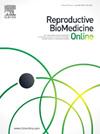TRANSVAGINAL ETHANOL SCLEROTHERAPY FOR ENDOMETRIOMAS: COMPLICATIONS, EFFECT ON OVARIAN RESERVE AND RECURRENCE RATES
IF 3.7
2区 医学
Q1 OBSTETRICS & GYNECOLOGY
引用次数: 0
Abstract
Objective
Surgical excision of endometriomas, especially with repeated procedures, can compromise ovarian reserve. Transvaginal ethanol sclerotherapy has become an increasingly popular treatment for endometriomas. However, the pre- and post-operative complications of transvaginal ethanol sclerotherapy for endometriomas are not well-documented. This study aims to report and describe the failures and complications associated with transvaginal ethanol sclerotherapy.
Materials and Methods
This was a prospective cohort study conducted at Ankara University School of Medicine between January 2022 and June 2024. The study protocol was approved by the university's ethics committee, and all participants provided written informed consent for the use of their medical data. During the study period, the inclusion criteria for ethanol sclerotherapy were women presenting with at least one endometrioma larger than 30 mm in diameter and requiring treatment for pain or infertility prior to assisted reproductive therapy. All study participants underwent preoperative evaluation using the IOTA Adnex model. Recurrence was defined as an endometrioma larger than 20 mm after 3 months.
Results
A total of 48 patients underwent ethanol sclerotherapy. No major complications were observed in any patient. The mean age of the patients was 32.36 ± 4.03 years, their BMI was 25.65 ± 4.93, and their pre-procedure AMH level was 2.51 ± 1.44 ng/mL. The mean post-procedure AMH level was 2.3 ± 1.40 ng/mL, indicating a slight decrease of 0.21 ng/mL on average. The minimum and maximum differences in AMH levels were -0.82 ng/mL and 0.55 ng/mL, respectively. No significant difference was found between the pre- and post-procedure AMH means (p=0.176). A total of 5 (10.41%)minor complications were observed among the 48 patients. Alcohol leakage occurred in 2 cases. One patient experienced urticaria-like symptoms, while another reported nausea and vomiting due to alcohol intoxication. Anaphylaxis was observed in 1 patient, likely due to the administered antibiotic, and was readily managed with adrenaline, steroids, and antihistamine treatments. Mild fever was reported in 1 patient and was addressed with oral antibiotics. Additionally, 1 patient experienced abdominal pain after the procedure, which resolved within 24 hours of follow-up. After 3 months follow up only 6 (12.5%) patients had recurrence.
Conclusion
Transvaginal ethanol sclerotherapy has proven to be an effective treatment, with a minimal impact on ovarian reserve, acceptable complication rates, and recurrence rates comparable to cystectomy.
求助全文
约1分钟内获得全文
求助全文
来源期刊

Reproductive biomedicine online
医学-妇产科学
CiteScore
7.20
自引率
7.50%
发文量
391
审稿时长
50 days
期刊介绍:
Reproductive BioMedicine Online covers the formation, growth and differentiation of the human embryo. It is intended to bring to public attention new research on biological and clinical research on human reproduction and the human embryo including relevant studies on animals. It is published by a group of scientists and clinicians working in these fields of study. Its audience comprises researchers, clinicians, practitioners, academics and patients.
Context:
The period of human embryonic growth covered is between the formation of the primordial germ cells in the fetus until mid-pregnancy. High quality research on lower animals is included if it helps to clarify the human situation. Studies progressing to birth and later are published if they have a direct bearing on events in the earlier stages of pregnancy.
 求助内容:
求助内容: 应助结果提醒方式:
应助结果提醒方式:


